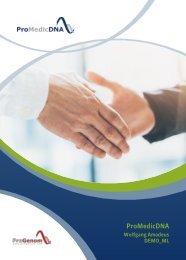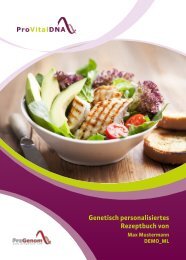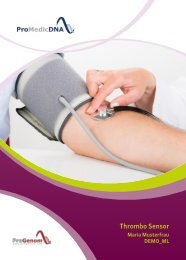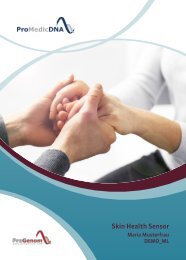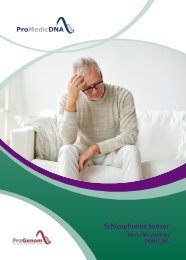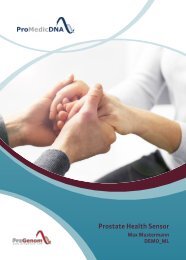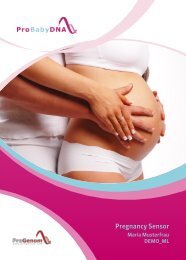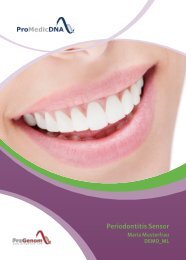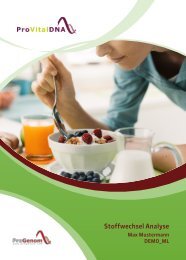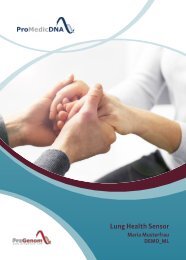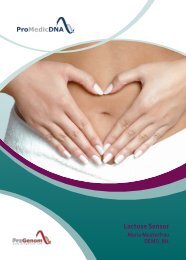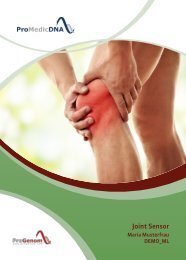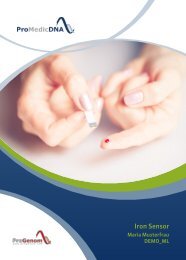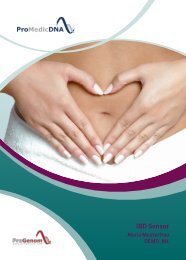ProVitalDNA - Package - DEMO EN
non-medical analysis - ProVitalDNA
non-medical analysis - ProVitalDNA
Create successful ePaper yourself
Turn your PDF publications into a flip-book with our unique Google optimized e-Paper software.
SCI<strong>EN</strong>CE<br />
The science of genes and excessive weight<br />
So far, several genes have been identified that affect body weight and determine which<br />
diet will be most effective for an individual.<br />
We have examined each of those genes in your analysis. Our method examines specific regions<br />
of genes, called SNPs, for traits that determine your predisposition to becoming overweight<br />
and the best weight loss strategy.<br />
Summary of the science<br />
This genetic analysis is supported by unusually strong scientific evidence. The genes have already been examined in<br />
numerous scientific studies such as more than 7500 studies on the PPARG gene, 167 studies on the FABP2 gene, 6897<br />
studies on the ADRB2 gene and 493 studies on FTO. This genetic weight loss program is based on the 53 most important<br />
studies examining the effect of genes on weight loss and nutrition. This genetic test analysed 8 genetic variations that<br />
have different effects on the body and is one of the most comprehensive genetic tests of this kind worldwide.<br />
As there are 53 different scientific studies involved in this program, this short review focuses on the most important<br />
claims only:<br />
➤ Genetic polymorphisms cause people to react in different ways to the fat and the carbohydrates they eat. It is<br />
helpful to only eat amounts of fat and carbohydrates that work best with your genetic profile.<br />
➤ People following a weight loss program adapted to their genetic profile tend to show a 2.5 times greater<br />
weight loss success than people following a standard dieting program.<br />
➤ Genetic polymorphisms influence how the body responds to exercise for weight loss.<br />
➤ Genetic differences influence how the body reacts to calorie reduction for losing weight.<br />
The program detects the genetic programming, adjusts the calorie distribution accordingly and sets the focus on the<br />
strategy that yields the best results. More exercise or fewer calories? The aim of this section is to provide evidence for<br />
each of these statements, and to set the scientific basis of this program.<br />
Statement 1<br />
People react differently to the fat content of their diet. The adjustment of the fat content in the diet<br />
may have a positive impact.<br />
One very interesting study with 720 subjects (Robitaille et al., Clin Genet 63: 109-116, 2003) showed that only people with<br />
an unfavorable variant of the PPARG gene (Pro12Ala) gained weight on a high-fat diet. This genetic impact has been<br />
confirmed in an independent study by another research group (Memisoglu et al., Human Molecular Genetics 12:<br />
2923-2929, 2001). Thus, a genetic analysis can predict the body's response to a high-fat or low-fat diet.<br />
16 Publications<br />
➤ http://www.jbc.org/content/276/43/39679.long J Biol Chem. 2001 Oct 26;276(43):39679-84. Epub 2001 Aug 3. The polymorphism at codon 54 of the<br />
FABP2 gene increases fat absorption in human intestinal explants. Levy E, Ménard D, Delvin E, Stan S, Mitchell G, Lambert M, Ziv E, Feoli-Fonseca<br />
JC, Seidman E.<br />
➤ http://ajcn.nutrition.org/content/90/6/1483.long Am J Clin Nutr. 2009 Dec;90(6):1483-8. Epub 2009 Oct 14. The FTO gene rs9939609 obesity-risk<br />
allele and loss of control over eating. Tanofsky-Kraff M, Han JC, Anandalingam K, Shomaker LB, Columbo KM, Wolkoff LE, Kozlosky M, Elliott C,<br />
Ranzenhofer LM, Roza CA, Yanovski SZ, Yanovski JA.<br />
➤ http://ajcn.nutrition.org/content/90/5/1418.long Am J Clin Nutr. 2009 Nov;90(5):1418-25. Epub 2009 Sep 2. Fat and carbohydrate intake modify<br />
the association between genetic variation in the FTO genotype and obesity. Sonestedt E, Roos C, Gullberg B, Ericson U, Wirfält E, Orho-Melander<br />
M.<br />
➤ http://www.ncbi.nlm.nih.gov/pubmed/?term=19901143 Arch Intern Med. 2009 Nov 9;169(20):1897-906. APOA2, dietary fat, and body mass index:<br />
replication of a gene-diet interaction in 3 independent populations. Corella D, Peloso G, Arnett DK, Demissie S, Cupples LA, Tucker K, Lai CQ,<br />
<strong>DEMO</strong>_ML Page 238 of 295




